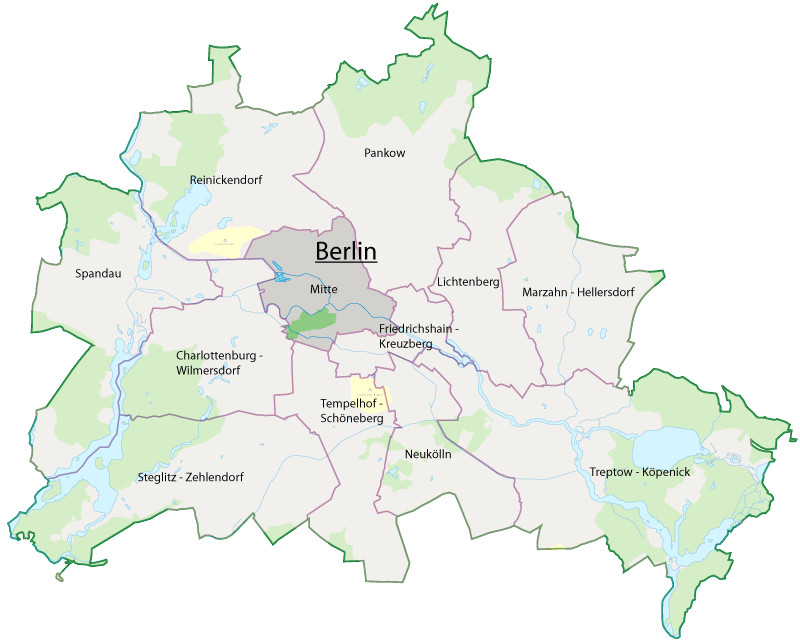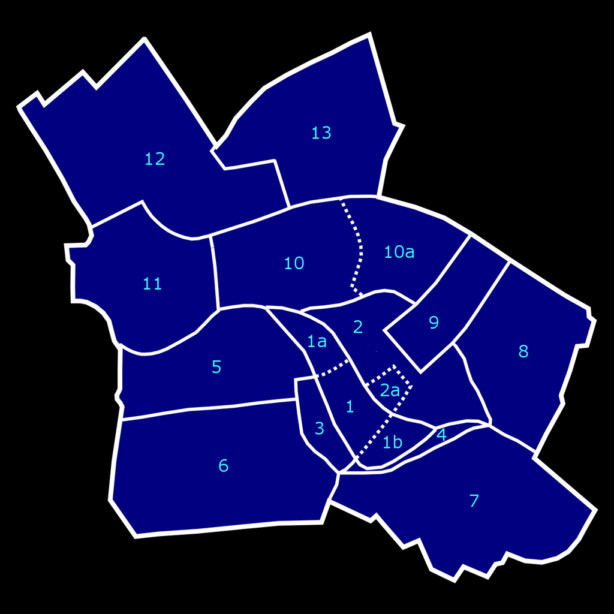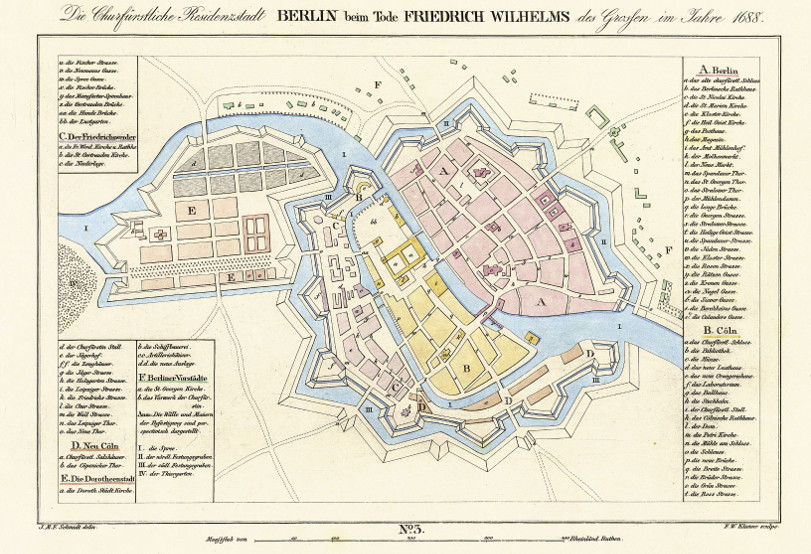Mitte 1933: Difference between revisions
(Created page with ";Berlin 1933 [[]] <br> <br>") |
|||
| (20 intermediate revisions by the same user not shown) | |||
| Line 1: | Line 1: | ||
;[[Berlin 1933]] | ;[[Berlin 1933]] | ||
[[]] | [[]] | ||
<br> | |||
<br> | |||
== Pronunciation == | |||
(Mit-Eh) | |||
== Location == | |||
[[File:Berlin mitte.jpg]] | |||
<br> | |||
<br> | |||
Situated in central Berlin and mostly in its old town, it is traversed by the river Spree. It borders the localities of Tiergarten, Moabit, Wedding, Gesundbrunnen, Prenzlauer Berg (in Pankow district), Friedrichshain, and Kreuzberg (both in Friedrichshain-Kreuzberg district). | |||
=== Subdivisions of Mitte === | |||
[[File:Berlin map Zones of Mitte.jpg]] | |||
<br> | |||
<br> | |||
Mitte is subdivided into 13 zones or neighborhoods (Stadtviertel) (the numbers refer to the map above): | |||
* -- [[Cölln]] (1) | |||
** -- [[Museum Island]] (1a) | |||
** -- [[Fischerinsel|Fisher Island]] (1b) | |||
* -- [[Alt-Berlin]] (2) | |||
** -- [[Nikolaiviertel]] (2a) | |||
* -- [[Friedrichswerder]] (3) | |||
* -- [[Neukölln am Wasser]] (4) | |||
* -- [[Dorotheenstadt]] (5) | |||
* -- [[Friedrichstadt (Berlin)|Friedrichstadt]] (6) | |||
* -- [[Luisenstadt]] (7) | |||
* -- [[Stralauer Vorstadt]] (8) | |||
* -- [[Alexanderplatz]] (9) | |||
* -- [[Spandauer Vorstadt]] (10) | |||
** -- [[Scheunenviertel]] (10a) | |||
* -- [[Friedrich-Wilhelm-Stadt]] (11) | |||
* -- [[Oranienburger Vorstadt]] (12) | |||
* -- [[Rosenthaler Vorstadt]] (13) | |||
<br> | |||
<br> | |||
== Description == | |||
Mitte (German for "middle, centre", commonly used without an article) is a central locality (Ortsteil) of Berlin in the homonymous district (Bezirk) of Mitte. Until 2001 it was itself an autonomous district. | |||
It comprises the historic center of Alt-Berlin around the churches of St. Nicholas and St. Mary, renowned Museum Island, the city hall Rotes Rathaus, the city administrative building Altes Stadthaus, the famous Fernsehturm, Brandenburg Gate at the end of the central boulevard Unter den Linden and more main tourist attractions of the city. For these reasons Mitte is considered the "heart" of Berlin. | |||
== History == | |||
[[File:ZLB-Berliner Ansichten-Januar.jpg]] | |||
<br> | |||
<br> | |||
The history of Mitte corresponds to the history of the entire city until the early 20th century, and with the Greater Berlin Act in 1920 it became the first district of the city. It was among the areas of the city most heavily damaged in World War II. | |||
Following a territorial redeployment by the Soviet Union and the United Kingdom that reshaped the borders of West Berlin's British Sector in August 1945, the western part of Staaken became in effect as of 1 February 1951 an exclave of Mitte, then still a borough of East Berlin. This ended on 1 January 1961, when western Staaken was incorporated into then East German Falkensee, which had already been under its de facto administration since 1 June 1952. | |||
Between 1961 and 1990 Mitte, one of the most important boroughs of East Berlin but close to all three western sectors of the city, was almost surrounded by the Berlin Wall. One of the most important border crossings was Checkpoint Charlie, near Kreuzberg. | |||
== Culture == | |||
== Population == | |||
== <span style="color:#800000;"> Vampiric Burgomeister == | |||
* -- [[Gustav Breidenstein]] -- ''Prince of Berlin'' | |||
== Places of Interest == | |||
=== Places / Squares / Streets === | |||
* -- [[Alexanderplatz]] --a large public square and transport hub in the central Mitte district of Berlin, near the Fernsehturm. Berliners often call it simply Alex, referring to a larger neighbourhood stretching from Mollstraße in the northeast to Spandauer Straße and the Rotes Rathaus in the southwest. | |||
* -- [[Altstadt]] | |||
* -- [[Bernauer Straße]] | |||
* -- [[Friedrichstraße]] | |||
* -- [[Gendarmenmarkt]] | |||
* -- [[Leipziger Straße]] | |||
* -- [[Lustgarten]] | |||
* -- [[Molkenmarkt]] (simply: whey market) | |||
* -- [[Museum Island]] | |||
* -- [[Nikolaiviertel]] | |||
* -- [[Oranienburger Straße]] | |||
* -- [[Pariser Platz]] | |||
* -- [[Potsdamer Platz]] | |||
* -- [[Schloßplatz]] (Berlin) | |||
* -- [[Unter den Linden]] | |||
=== Buildings & Structures === | |||
* -- [[Alte Nationalgalerie]] -- The Alte Nationalgalerie (Old National Gallery) in Berlin is a gallery showing a collection of Neoclassical, Romantic, Biedermeier, Impressionist and early Modernist artwork, part of the Berlin National Gallery, which in turn is part of the Staatliche Museen zu Berlin. It is the original building of the National Gallery and is situated on Museum Island. | |||
* -- [[Berliner Stadtschloss]] -- The Berlin City Palace was a royal and imperial palace in the center of Berlin, the historical capital of Prussia, and subsequently Germany. It was located on the Museum Island at Schlossplatz, opposite the Lustgarten park. It was the winter residence of the Kings of Prussia and the German Emperors. | |||
* -- [[Zoological Gardens of Berlin]] is the oldest and best known zoo in Germany. | |||
== Websites == | |||
https://en.wikipedia.org/wiki/Mitte_(locality) | |||
<br> | <br> | ||
<br> | <br> | ||
Latest revision as of 02:42, 13 January 2017
[[]]
Pronunciation
(Mit-Eh)
Location

Situated in central Berlin and mostly in its old town, it is traversed by the river Spree. It borders the localities of Tiergarten, Moabit, Wedding, Gesundbrunnen, Prenzlauer Berg (in Pankow district), Friedrichshain, and Kreuzberg (both in Friedrichshain-Kreuzberg district).
Subdivisions of Mitte

Mitte is subdivided into 13 zones or neighborhoods (Stadtviertel) (the numbers refer to the map above):
- -- Cölln (1)
- -- Museum Island (1a)
- -- Fisher Island (1b)
- -- Alt-Berlin (2)
- -- Nikolaiviertel (2a)
- -- Friedrichswerder (3)
- -- Neukölln am Wasser (4)
- -- Dorotheenstadt (5)
- -- Friedrichstadt (6)
- -- Luisenstadt (7)
- -- Stralauer Vorstadt (8)
- -- Alexanderplatz (9)
- -- Spandauer Vorstadt (10)
- -- Scheunenviertel (10a)
- -- Friedrich-Wilhelm-Stadt (11)
- -- Oranienburger Vorstadt (12)
- -- Rosenthaler Vorstadt (13)
Description
Mitte (German for "middle, centre", commonly used without an article) is a central locality (Ortsteil) of Berlin in the homonymous district (Bezirk) of Mitte. Until 2001 it was itself an autonomous district.
It comprises the historic center of Alt-Berlin around the churches of St. Nicholas and St. Mary, renowned Museum Island, the city hall Rotes Rathaus, the city administrative building Altes Stadthaus, the famous Fernsehturm, Brandenburg Gate at the end of the central boulevard Unter den Linden and more main tourist attractions of the city. For these reasons Mitte is considered the "heart" of Berlin.
History

The history of Mitte corresponds to the history of the entire city until the early 20th century, and with the Greater Berlin Act in 1920 it became the first district of the city. It was among the areas of the city most heavily damaged in World War II.
Following a territorial redeployment by the Soviet Union and the United Kingdom that reshaped the borders of West Berlin's British Sector in August 1945, the western part of Staaken became in effect as of 1 February 1951 an exclave of Mitte, then still a borough of East Berlin. This ended on 1 January 1961, when western Staaken was incorporated into then East German Falkensee, which had already been under its de facto administration since 1 June 1952.
Between 1961 and 1990 Mitte, one of the most important boroughs of East Berlin but close to all three western sectors of the city, was almost surrounded by the Berlin Wall. One of the most important border crossings was Checkpoint Charlie, near Kreuzberg.
Culture
Population
Vampiric Burgomeister
- -- Gustav Breidenstein -- Prince of Berlin
Places of Interest
Places / Squares / Streets
- -- Alexanderplatz --a large public square and transport hub in the central Mitte district of Berlin, near the Fernsehturm. Berliners often call it simply Alex, referring to a larger neighbourhood stretching from Mollstraße in the northeast to Spandauer Straße and the Rotes Rathaus in the southwest.
- -- Altstadt
- -- Lustgarten
- -- Molkenmarkt (simply: whey market)
- -- Schloßplatz (Berlin)
Buildings & Structures
- -- Alte Nationalgalerie -- The Alte Nationalgalerie (Old National Gallery) in Berlin is a gallery showing a collection of Neoclassical, Romantic, Biedermeier, Impressionist and early Modernist artwork, part of the Berlin National Gallery, which in turn is part of the Staatliche Museen zu Berlin. It is the original building of the National Gallery and is situated on Museum Island.
- -- Berliner Stadtschloss -- The Berlin City Palace was a royal and imperial palace in the center of Berlin, the historical capital of Prussia, and subsequently Germany. It was located on the Museum Island at Schlossplatz, opposite the Lustgarten park. It was the winter residence of the Kings of Prussia and the German Emperors.
- -- Zoological Gardens of Berlin is the oldest and best known zoo in Germany.